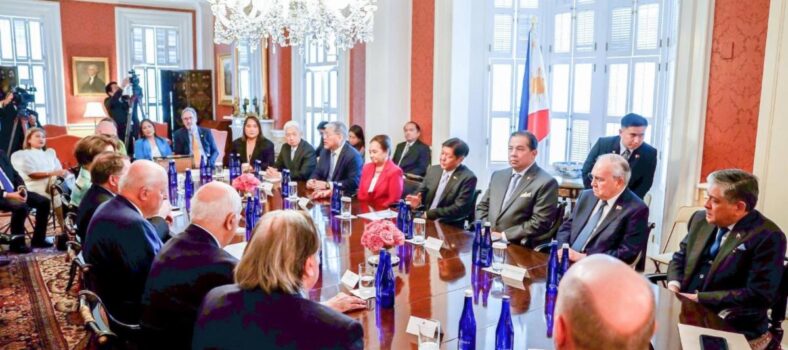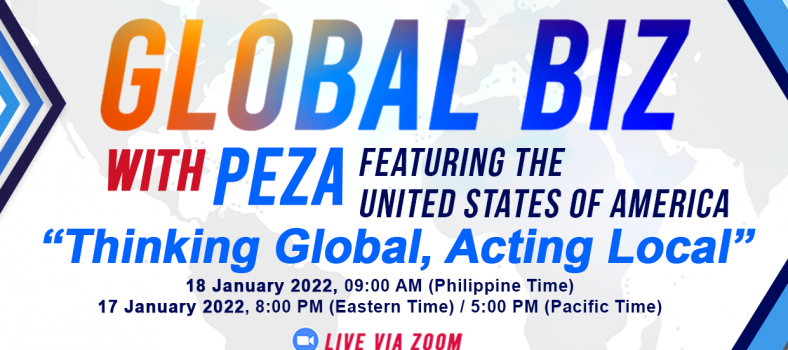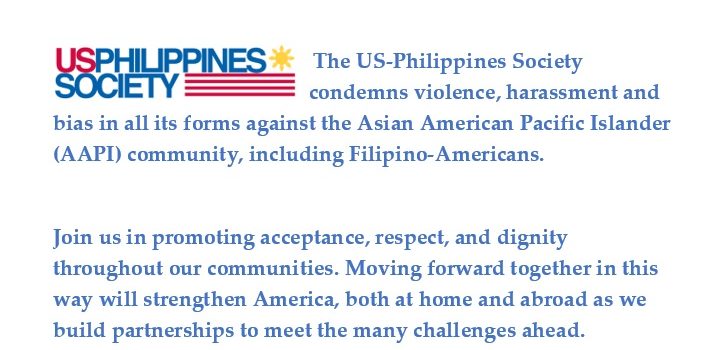Strategic and Business Value of Strong PH-US Economic Ties
Strategic and Business Value of Strong PH-US Economic Ties
Remarks by Hank Hendrickson
US-Philippines Society Executive Director
A Virtual Forum: PEZA Global Business Forum featuring the USA
January 17, 2022 (ET)
The US-Philippines Society welcomes opportunities to spotlight “win-win” developments in the Philippine-American relationship. For those who may not be familiar with the Society’s work, our mission is wide-ranging, a comprehensive effort to raise awareness of and appreciate dynamics embedded in the relationship between our two countries.
For example, we have highlighted significant historical events as far back as Balangiga in 1901, and earlier, and the role of Society members in the Bells return in 2018. We’ve drawn public attention to steps on the road toward independence and the re-casting of 20th century bilateral ties, including the 1916 Jones Act, shared sacrifices during World War II, and key areas of cooperation over the 75 years the two countries have worked together as sovereign nations.
The Society has highlighted strategic cooperation that promotes the security interests of both sides, facilitating U.S. engagement in the region, providing steady assurances through the 70 year-old Mutual Defense Treaty, and documenting the basis for cooperation on force modernization, transnational threats, and efforts to promote rules-based solutions in the South China Sea.
Sharing the rich Philippine cultural and literary traditions with American audiences has been especially rewarding. The Society has partnered with Washington’s Kennedy Center to showcase performances by the Bayanihan Dance Group, internationally recognized concert pianist Cecile Licad, and singer/actress Lea Salonga, among other top artists. And, we have worked with Filipino and Fil-Am groups on a series of historical, literary and academic forums designed to show US-Philippines cultural and educational linkages.
Fund-raising for disaster response became a Society priority after the devastation of Typhoon Haiyan in 2013. Partnerships with foundations working on-the-ground headed by our Philippine-based membership, including co-chair Manny Pangilinan, have continued to this day providing assistance to communities struck by Typhoon Odette. And, the Society received donations to support educational, housing, and health care assistance to persons displaced from the 2017 Marawi siege.
But, this evening we have a special opportunity to participate in a program on the Philippine Economic Zone Authority and to call attention to the benefits to both the United States and the Philippines that flow from ecozone investment.
Ecozones represent a vital, tangible subset of a more broadly-based pattern of U.S.-Philippine economic engagement that is rooted in history and now geared to meet 21st century needs and realities. From our window on Washington, it’s clear that Indo-Pacific policy thinkers in government increasingly attach strategic value to business and commercial ties between our two countries, as a complement to enhanced security and political relations, and cooperation on global challenges of the pandemic, climate change, and other transnational threats. For example, the joint vision statement issued after the recent Bilateral Strategic Dialogue committed to “expand and deepen relations through sustained engagement in all fields.” There was an explicit commitment to “accelerate, advance, and increase trade and investments” and to “strengthen the resiliencies of regional supply chains” – an area ripe for development, I should add.
In its 2021 Philippine section of a review of investment climates around the world, the State Department recognized the ecozones operated by PEZA for “regulatory transparency, no red-tape policies, and one-stop shop services for investors.” This is a credit to Director General Charito Plaza, her staff and those like Lilia de Lima who helped build PEZA and gave it international credibility.
In addition to being an element that reinforces strategic linkages, ecozones can make a positive impact in regional development within the Philippines, especially in areas facing the challenges of poverty and conflict – I’m thinking of the potential for more ecozone development in Mindanao specifically.
To address a theme this evening, “Business and Investment Opportunities between the Philippines and the United States,” it is important to understand the policy context. Looking back over the past five years, I recall accompanying Society co-chair John Negroponte on a visit to Manila in November 2016 just after the election of Donald Trump. This was a time when both American political parties had publicly moved away from TPP, raising questions about what new approaches on trade would be in the offing. At an AmCham breakfast meeting, Ambassador Negroponte was asked about the incoming administration’s trade policies. He responded, in part, saying it was clear from the campaign that there would be a strong preference for bilateral arrangements, and that it would make sense for the Philippines to begin developing proposals for the kind of agreement they would like to see.
In the years that followed there was progress, but for a variety of reasons, a formal Bilateral Trade Agreement was not achieved. That said, steps taken under a Trade and Investment Framework Agreement improved the overall environment. Fast forwarding to 2022, I don’t sense an appetite in the administration in Washington for new initiatives toward bilateral or even regional trade policy negotiations.
But, the two governments will remain active on trade and investment promotion and facilitation, as represented, for example, by this program and a variety of other outreach efforts on the Philippine side, including the energetic work being carried out by Ambassador Romualdez and his staff, and on the U.S. side, through vehicles like assistance available under the International Development Finance Corporation and the efforts of Heather’s team at the embassy, including Commerce and USAID, and of course the State Department. Companies will also benefit from tapping the experience of non-governmental associations like the US-Asean Business Council and the Chamber of Commerce, as well as country-specific organizations like USINDO for work in Indonesia or the US-Philippines Society.
It’s commendable that the Philippine side is specifically targeting American business and investment. In addition to expanding traditional sectors, the U.S. can offer cutting edge and niche opportunities through technologies and improved processes.
While there is not an expectation for broader trade policy talks, the two governments will engage on issue-specific concerns. GSP extension could be a negotiation to watch during the review period. Also, in terms of a government role, we would like to see how far, in concrete terms, the U.S. can translate its “vision” on strengthening supply chains into an expanded partnership with Philippine suppliers.
In a concluding note on collateral benefits provided by the PEZA example, American members of the US-Philippines Society who are forceful advocates for ecozones, expect that PEZA’s success and commitment to quality and transparency – a commitment shared by Clark and Subic zone administrators – are making a positive impact on Philippine business practices outside of ecozones that serve the growing domestic market and will need to meet ever higher expectations as the Philippine middle class and its purchasing power expand.
Before I conclude, in the interest of two-way business promotion, please allow a quick plug for investing in the United States. As our trade representative at the U.S. embassy will tell you, America is open for business. The markets are strong, and many countries have found that reaching those markets can be facilitated through investments inside the U.S. to complement partnerships with American corporations abroad.
Of particular interest will be advantages afforded by the tax code that has been made more corporate friendly with rates below the OECD average, and with provisions that do not expire.
Thanks for your interest in promoting US-Philippine business and investment, in taking advantage of opportunities created by the Philippine Economic Zone Authority, and for your support for the continuing work of the US-Philippines Society.




